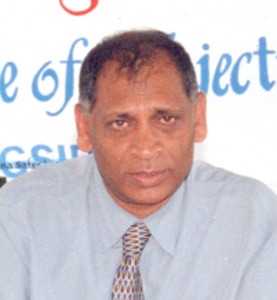The local PAHO/WHO office has been working continuously with the Ministry of Health in monitoring the country’s dengue situation, given that the highest number of cases for the decade was recorded this year.
However, Minister of Health Dr Leslie Ramsammy said even though there were 300 dengue cases diagnosed here for this year Guyanese should not be overly worried as no deaths have been recorded and the deadly strain of the disease had not been detected.

He said that unlike Trinidad & Tobago, which has now asked a team from PAHO in the US to assess that country’s ongoing dengue situation, Guyana would continue to work with the local PAHO office. Trinidad & Tobago has recorded deaths from the disease this year.
The PAHO/WHO office in Guyana in collaboration with the ministry plans to release a comprehensive anti-dengue programme next month. The programme started several years ago mainly to increase reports on dengue outbreaks with associated deaths and on the potential for climate change to make the dengue situation far worse than at any time in history.
Ramsammy, in a recent statement also pointed out that the high number of diagnoses also reflected Guyana’s success in surveillance; in more testing being done and a better system and capacity for testing and diagnosis and reporting.
Ramsammy said Guyana was one of the few countries that have been spared the wretchedness of dengue and the agony of deaths due to the disease. However, he pointed out that the country has always been poised to experience a dengue epidemic with serious consequences because the main vector for dengue is well established in Guyana, especially in large population centres.
In continuing to monitor the dengue situation, Ramsammy said his ministry has asked all health facilities, including private institutions, to report suspected cases of dengue to the ministry. He said the ministry had appointed a special surveillance officer more than a year ago, to coordinate the analysis of all dengue reports from around the country while a daily dengue report was prepared for the minister and Chief Medical Officer, Dr Shamdeo Persaud.
He said all reported cases of dengue were tracked by the ministry through a special surveillance team and the ministry has ensured laboratory confirmation of all reported cases. In addition, Dr Ramsammy said the ministry has distributed treatment guidelines to both the public and private health sector practitioners to ensure patients are receiving an adequate standard of treatment.
And because dengue is a mosquito-borne disease, the interruption of the breeding process of mosquitoes is important in the overall response to the disease and families and communities can participate in this exercise. The minister noted that how people deal with their garbage is important as poor sanitation habits sometimes lead to the creation of breeding sites.





